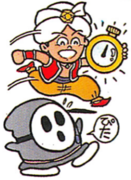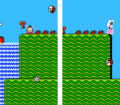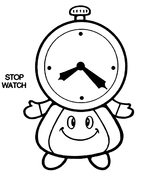Stop Watch: Difference between revisions
No edit summary |
(New spelling in the TTYD remake) |
||
| Line 1: | Line 1: | ||
{{move|Stopwatch}} | |||
{{redirect|Stopwatch|the other recurring watch item|[[+ Clock]]}} | {{redirect|Stopwatch|the other recurring watch item|[[+ Clock]]}} | ||
{{about|the item that freezes enemies and/or the environment|other types of timers|[[Timer]]}} | {{about|the item that freezes enemies and/or the environment|other types of timers|[[Timer]]}} | ||
Revision as of 06:54, June 10, 2024
- "Stopwatch" redirects here. For the other recurring watch item, see + Clock.
- This article is about the item that freezes enemies and/or the environment. For other types of timers, see Timer.
| Stop Watch | |
|---|---|
| First appearance | Yume Kōjō: Doki Doki Panic (1987, overall) Super Mario Bros. 2 (1988, Super Mario franchise) |
| Latest appearance | Paper Mario: The Thousand-Year Door (Nintendo Switch) (2024) |
Stop Watches[1] (alternatively formatted as Stopwatches),[2][3][4] also known as Time Stops,[5] appear in the Super Mario franchise as clock items that usually slow down or stop time when collected.
History
Yume Kōjō: Doki Doki Panic / Super Mario Bros. 2
If the player first pulls up four large vegetables in Yume Kōjō: Doki Doki Panic and Super Mario Bros. 2, pulling up what would be a fifth one will instead reveal a Stop Watch. It will appear for a second and then freeze everything in the level for a few seconds. This gives a window of opportunity for Mario and his friends to avoid or defeat enemies and collect small hearts. However, touching the frozen enemies still hurts the player. Stop Watches have gray/green sprites in the original release. In the Super Mario All-Stars version, however, they are depicted as gold when playing as Mario or Luigi, gold with a dark red outline as Princess Toadstool, or blue with a brown outline as Toad. This is due to the Stop Watch using the same palette as the player character, consequently subjecting them to any changes done when switching characters. In Super Mario Advance, Stop Watches are orange.
Nintendo Comics System
In the Nintendo Comics System story Cloud Nine, it appears as an animate object who acts as the Mushroom King's alarm clock, dodging the grumpy King's attempts to swat him and fearfully running to Princess Toadstool for safety.
Paper Mario series
Paper Mario
The Stop Watch later appears as an item in Paper Mario. When Mario or his partners use it, it will immobilize enemies for a few turns (assuming it is successful). It can be bought at most stores and is a fairly common item. Stop Watches appear in the following locations:
- In a hidden block in the first scene of the Ultra Boots area in Toad Town Tunnels.
- On top of a brick block one screen south of the next-to-last part of the main road of Dry Dry Desert.
- Behind a bush in the back of the shore where Whale resides.
- In a hidden block before the stairs where Mario fights Monstar in Shiver Snowfield.
- On sale at Boo's Shop (25 coins) and the Star Haven Shop (15 coins).
- Dropped by Lakitus.[6]
Paper Mario: The Thousand-Year Door
It reappears in Paper Mario: The Thousand-Year Door as the Stopwatch. Here, it is a somewhat rare item, for it can only be purchased in Twilight Town or Fahr Outpost. The item will immobilize enemies, just as in the game's predecessor. However, enemies can also use the item against Mario or his partners. Several warped clocks appearing in various colors will appear on-screen after using the item. After about four seconds, the item takes effect and immobilizes its target.
Stop Watches appear in the following locations:
- In a rock on the moon surface near where Mario lands.
- Behind near the entrance in the first part of descending stairs in the Palace of Shadow.
- On sale at Twilight Shop (30 coins) and Northwinds Mart (12 coins), and Charlieton (24 coins).
- Dropped by ordinary Magikoopas, Moon Clefts, Bob-ombs, Bulky Bob-ombs, Bob-ulks, Wizzerds, Dark Wizzerds, Elite Wizzerds, X-Nauts, X-Naut PhDs, Elite X-Nauts, as well as the Dull Bones, Bob-ombs, and all the Fuzzies in Glitz Pit.[7]
Super Paper Mario
The Stop Watch also appears as an uncommon item in Super Paper Mario, where it immobilizes all enemies.
Mario & Luigi: Dream Team
The Stop Watch appears again in Mario & Luigi: Dream Team as a badge effect that occurs when mixing the Miracle Badge with the Gold Badge.
Unused appearances
Stopwatches are unused items in Super Mario Advance 4: Super Mario Bros. 3, where they would have functioned like they did in Super Mario Bros. 2.[8]
Profiles
Super Mario Bros. 2
- Wii Virtual Console manual: "If you've pulled up enough vegetables, this item will temporarily freeze your enemies."
Gallery
A Stop Watch from Super Mario Bros. 2
Princess Toadstool pulling up a Stop Watch to stop a Phanto in Super Mario Bros. 2
Artwork from Super Mario All-Stars
Location of the Stop Watch in Toad Town Tunnels of Paper Mario
A Time Stop from Super Mario Advance
An unused Stop Watch from Super Mario Advance 4: Super Mario Bros. 3
Names in other languages
| Language | Name | Meaning | Notes |
|---|---|---|---|
| Japanese | ストップウォッチ[9] Sutoppuwocchi |
Stop Watch | |
| Chinese | 静止钟 (Paper Mario)[?] Jìngzhǐ Zhōng |
Static Clock | |
| Chinese (simplified) | 暂停时钟 (The Thousand-Year Door remake)[?] Zàntíng Shízhōng |
Pause Clock | |
| Chinese (traditional) | 暫停時鐘 (The Thousand-Year Door remake)[?] Zàntíng Shízhōng |
Pause Clock | |
| French | Chronomètre[?] | Timer | |
| Montre-Stop[?] | Stop-Watch | ||
| Montre au pouvoir immobilisant (Super Mario All-Stars)[?] | Immobilizing-power watch | ||
| Stop Temps (Super Mario Advance)[?] | Time Stop | ||
| German | Stoppuhr[?] | Stop Watch | |
| Italian | Segnale di fermata del tempo[10] | Time stop signal | |
| Paralogio (Paper Mario series)[?] | Portmanteau of paralizzare ("paralize") and orologio ("clock") | ||
| Timer[11][12] | - | ||
| Orologio[13] | Clock | ||
| Korean | 스톱워치[?] Seutop-wochi |
Stop Watch | |
| Spanish (NOE) | Reloj parado (Super Paper Mario onwards)[?] | Stopped clock | |
| Reloj Parado[?] | Stopped Clock |
Trivia
- An official 1989 Super Mario Bros. 2 character sheet that was given to third party companies getting the Super Mario license for products, included "Stop Watch" as a character. Despite the Stop Watch being merely an item in the original game, this character sheet gave the bottom of the watch part a base with eyes, mouth, legs and hands.[14] This Stop Watch character is the same one later used briefly in the Nintendo Comics System story, Cloud Nine. The character likely originated from a misinterpretation of the Stop Watch illustration in the game's manual, which shows Mario plucking the item from the ground.[15]
References
- ^ Nintendo (1993). Super Mario All-Stars instruction booklet. Nintendo of America (American English). Page 21.
- ^ July/August 1988. Nintendo Power Volume 1. Nintendo of America (American English). Page 10.
- ^ Super Mario All-Stars Player's Guide. Nintendo of America (American English). Page 88.
- ^ Arnold, J. Douglas, James Yamada, and Mark Elies (June 4, 2001). Super Mario Advance Official Perfect Guide. Versus Books (American English). ISBN 0970646844. Page 5.
- ^ Nintendo (2001). Super Mario Advance instruction booklet. Nintendo of America (American English). Page 29.
- ^ Floogal (December 23, 2006). Paper Mario Stat/Attack Guide. GameFAQs (English). Retrieved October 17, 2016.
- ^ Jdaster64 (April 7, 2016). Paper Mario: The Thousand-Year Door Enemy Item/Badge Drop FAQ. GameFAQs. Retrieved October 11, 2016.
- ^ Super Mario Advance 4: Super Mario Bros. 3/Unused Objects. The Cutting Room Floor. Retrieved January 26, 2023.
- ^ Nintendo (1987). Yume Kōjō: Doki Doki Panic instruction booklet. Nintendo (Japanese). Page 27.
- ^ Super Mario Bros. 2 Italian manual. Page 21.
- ^ Super Mario All-Stars Limited Edition Italian manual. Page 33.
- ^ Super Mario Bros. 2 (3DS - Virtual Console) Italian e-manual. Page 10.
- ^ Super Mario Enciclopedia Italian manual. Page 70.
- ^ August 13, 2020. Official 1989 Super Mario Bros. 2 character sheet given to companies obtaining a Mario license by Nintendo of America for reference. Besides characters and items directly from the game, it also contains the original “Stop Watch” character that exists only in select pieces of North American licensed material, such as greeting cards and one issue of the Valiant Super Mario Bros. comics. Its game equivalent is the Stop Watch item that looks like an ordinary watch.. Supper Mario Broth (English). Retrieved June 2, 2024.
- ^ MarioBrothBlog (December 5, 2022). Previously, I have posted about the enigmatic "Stop Watch" character, an animate version of the Stop Watch item from Super Mario Bros. 2 that appeared in a few licensed works. Reader @RealSplatJam discovered that it likely originated from a misinterpretation of the game's manual.. X. Retrieved June 2, 2024.







